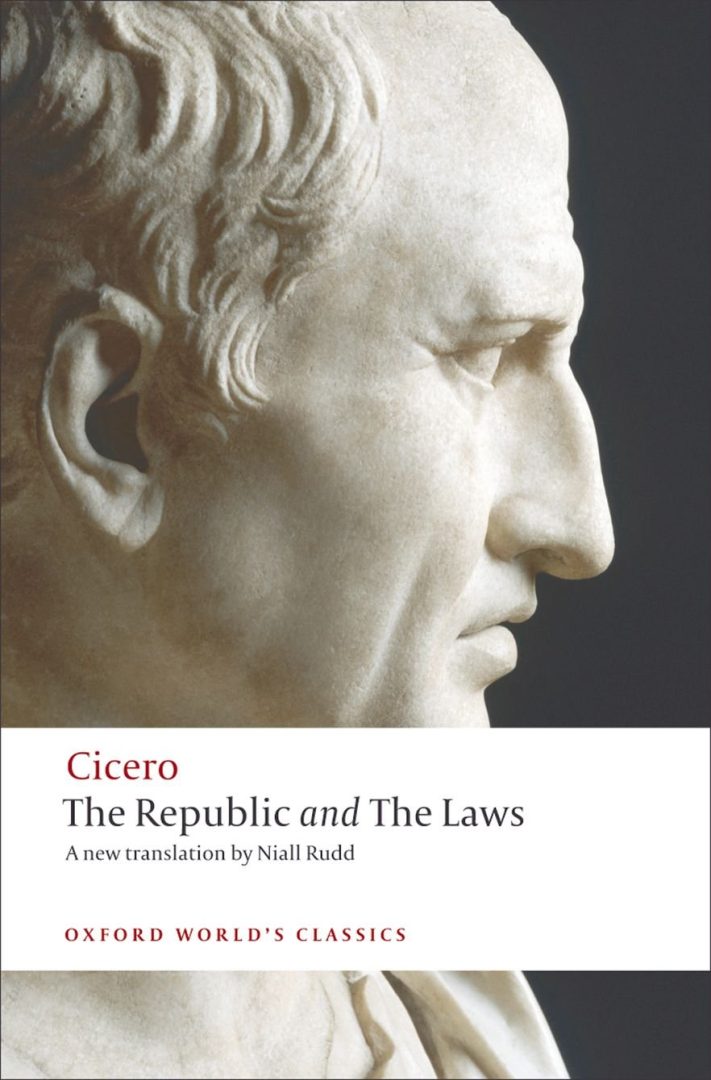Liberty, Law, and the Soul of the State
Table of Contents
Philosophy in the Forum: A Roman Take on the Ideal State
To read Cicero is to hear the Roman mind thinking out loud—eloquent, analytical, and deeply engaged with both action and contemplation. In The Republic and The Laws, Cicero steps beyond his typical oratory to compose a philosophical vision of the just state, the rightful citizen, and the moral law that transcends all human decrees.
While The Republic is more speculative and mimics Plato’s dialogic form, The Laws is practical, focusing on a legal framework for society grounded in Stoic cosmology and Roman sensibility.
These works, written in the final decades of the Roman Republic, are not ivory tower musings. They are urgent interventions in a crumbling political order, seeking to realign Rome with its lost virtue.
Content Overview
De Re Publica (The Republic):
Modeled on Plato’s Politeia, Cicero stages a philosophical dialogue in six books (though only fragments of some survive) discussing the best form of government. His conclusion? A mixed constitution combining monarchy, aristocracy, and democracy offers the most stability and justice—reflecting Rome’s own republican structure of consuls, Senate, and popular assemblies.
De Legibus (The Laws):
A three-book sequel that sets out a code of natural law rooted in reason, virtue, and the divine order of the cosmos. Laws, for Cicero, are not mere commands backed by power. True laws are those in harmony with nature and reason—and any unjust law is no law at all.
Key Themes
- Natural Law: Central to both works is Cicero’s doctrine that lex naturae—a law written into the universe by divine reason—precedes and legitimizes human law.
- Virtue and Statesmanship: The good of the state depends on the virtue of its citizens and leaders. Political decay is a moral failure before it is institutional.
- Mixed Government: Unlike Plato’s utopia, Cicero favors balance over perfection—a constitution where the powers restrain and support one another.
- Justice as Harmony: Justice is not just legality; it is right order, both in the state and in the soul. His echoes of Stoic moral order are clear here.
- Piety and Religion: Religion, far from being separate from politics, is an essential foundation of Cicero’s ideal state. Law without reverence becomes tyranny.
Strengths and Limitations
Strengths:
- Philosophically rich, yet Roman-pragmatic: Merges Greek theory with Roman statecraft.
- Lays groundwork for constitutional thought: Influences Montesquieu, Locke, and American federalism.
- Moral depth: The call for virtue is not rhetorical—it’s integral.
- Language and form: Elegant Latin, modeled after Platonic dialogue but more rhetorical and oratorical.
Limitations:
- Fragmentary: Much of The Republic is lost, and what survives is reconstructed from palimpsests.
- Less systematic than Plato: The arguments can drift or repeat, and the dialogue form sometimes loses clarity.
- Historical hindsight: Written on the eve of civil war, it can feel nostalgic or idealistic, detached from the political realities of its day.
- Assumes elite readership: Much of Cicero’s philosophy assumes educated, Roman male citizens as its audience.
What Makes It Special
What gives The Republic and The Laws enduring value is how deeply integrated Cicero’s ethics are with his politics. Unlike Machiavelli or Hobbes, Cicero refuses to separate moral good from political success. A state that is unjust cannot be called a state at all.
In this, Cicero becomes a conduit between Plato and the Christian West, infusing classical natural law into a Roman vessel—one that would influence Augustine, Aquinas, Locke, and the U.S. Constitution alike.
In fact, phrases like “the welfare of the people is the highest law” (salus populi suprema lex esto) originate here.
Comparison and Context
- Plato’s Republic vs Cicero’s: Plato’s republic is ruled by philosopher-kings and built on strict class hierarchies and communal ownership. Cicero instead wants moral statesmen, religious respect, and political compromise.
- Stoicism’s Influence: While not a Stoic, Cicero draws heavily from Stoic ideas of logos, duty, and providence. For him, reason is divine—and it must govern both men and laws.
- Roman Pragmatism: Cicero doesn’t fantasize about utopias. He starts from history—especially Rome’s—and seeks a path forward from real politics to ideal principles.
Who Should Read It
- Anyone interested in the philosophical roots of Western law and government
- Readers seeking a Roman response to Plato
- Students of natural law theory, Stoicism, or political ethics
- Those looking to understand how virtue and liberty intertwine in classical thought
These works are especially illuminating when read in tandem with modern constitutional documents and Enlightenment-era philosophy.
Final Thoughts
Cicero’s The Republic and The Laws are not just relics of a fallen Rome. They are blueprints for a civilization built on reason, justice, and the moral dignity of law. In an era where political discourse often divorces legality from virtue, Cicero reminds us that the soul of the state is the soul of its citizens.
For those with ears to hear, his voice still echoes with Roman clarity:
“We are servants of the law so that we may be free.”
TL;DR
| Category | Details |
|---|---|
| Author | Marcus Tullius Cicero |
| Works | De Re Publica (6 books, partially lost); De Legibus (3 books) |
| Skill Level | Intermediate to Advanced (some background in Roman history/philosophy helps) |
| Teaching Style | Philosophical dialogues, blending theory with Roman precedent |
| Key Themes | Natural law, virtue, mixed constitution, justice, moral politics |
| Strengths | Constitutional foresight, moral clarity, Roman realism, eloquent argument |
| Challenges | Fragmentary text, elite assumptions, indirect structure |
| Best For | Political philosophers, legal theorists, students of the Western canon |
| Companions | Plato’s Republic, Aristotle’s Politics, Aquinas’ Summa, Locke’s works |
| Verdict | A Roman masterwork on justice, liberty, and law—where ethics meets governance |

Leave a Reply